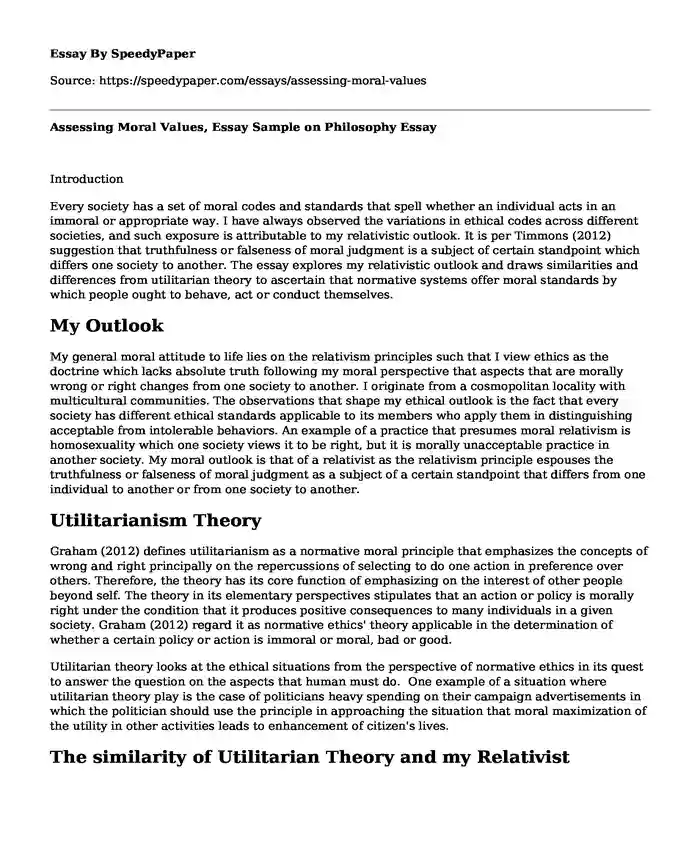
| Type of paper: | Essay |
| Categories: | Philosophy Ethics |
| Pages: | 3 |
| Wordcount: | 712 words |
Introduction
Every society has a set of moral codes and standards that spell whether an individual acts in an immoral or appropriate way. I have always observed the variations in ethical codes across different societies, and such exposure is attributable to my relativistic outlook. It is per Timmons (2012) suggestion that truthfulness or falseness of moral judgment is a subject of certain standpoint which differs one society to another. The essay explores my relativistic outlook and draws similarities and differences from utilitarian theory to ascertain that normative systems offer moral standards by which people ought to behave, act or conduct themselves.
My Outlook
My general moral attitude to life lies on the relativism principles such that I view ethics as the doctrine which lacks absolute truth following my moral perspective that aspects that are morally wrong or right changes from one society to another. I originate from a cosmopolitan locality with multicultural communities. The observations that shape my ethical outlook is the fact that every society has different ethical standards applicable to its members who apply them in distinguishing acceptable from intolerable behaviors. An example of a practice that presumes moral relativism is homosexuality which one society views it to be right, but it is morally unacceptable practice in another society. My moral outlook is that of a relativist as the relativism principle espouses the truthfulness or falseness of moral judgment as a subject of a certain standpoint that differs from one individual to another or from one society to another.
Utilitarianism Theory
Graham (2012) defines utilitarianism as a normative moral principle that emphasizes the concepts of wrong and right principally on the repercussions of selecting to do one action in preference over others. Therefore, the theory has its core function of emphasizing on the interest of other people beyond self. The theory in its elementary perspectives stipulates that an action or policy is morally right under the condition that it produces positive consequences to many individuals in a given society. Graham (2012) regard it as normative ethics' theory applicable in the determination of whether a certain policy or action is immoral or moral, bad or good.
Utilitarian theory looks at the ethical situations from the perspective of normative ethics in its quest to answer the question on the aspects that human must do. One example of a situation where utilitarian theory play is the case of politicians heavy spending on their campaign advertisements in which the politician should use the principle in approaching the situation that moral maximization of the utility in other activities leads to enhancement of citizen's lives.
The similarity of Utilitarian Theory and my Relativist Outlook
Relativism and utilitarianism are similar because if the objective of utilitarianism is to capitalize on contentment majority of individuals, it follows the principle of relativism that an appropriate action has the basis of the standpoint of the majority people (Timmons, 2012). The similarity arises from the fact that the appropriateness of an action is as per the preference of the majority of individuals who see it as morally right while the minority view it as wrong. In a nutshell, action's appropriateness is comparative to majority's viewpoint who consider the action morally appropriate.
Differences between Utilitarian Theory and my Relativist Outlook
The difference between utilitarianism and moral relativism is the size of target individuals. While moral relativism, utilitarianism apply to two or people who form the majority in a group (Timmons, 2012). Secondly, utilitarianism has the basis of consequences of the action and uses Intrinsic Value Theory while morals relativism has its focus on the notion of an individual or society on the inappropriateness of the action (Graham, 2012).
Conclusion
It is evident from the similarities of utilitarianism and relativism that they both form the basis of normative systems by offering the standards by which people ought to behave, act or conduct themselves. Differences show that the practicability of each theory depends on the number of target individuals. I have learned that my outlook is a factor of moral codes and practices in existence in my society and are also the foundation of both theories.
References
Graham, G. (2012). Eight theories of ethics. New York: Taylor and Francis Group.
Timmons, M. (2012). Moral theory: An introduction. Lanham, Md.: Rowman & Littlefield Publishers.
Cite this page
Assessing Moral Values, Essay Sample on Philosophy. (2018, Jan 16). Retrieved from https://speedypaper.com/essays/assessing-moral-values
Request Removal
If you are the original author of this essay and no longer wish to have it published on the SpeedyPaper website, please click below to request its removal:
- Application Example for Master's Degree in Information Technology
- Essay Example about the National Incident Management System
- Free Essay Sample about Individualized Care Plan Development
- Essay Sample on Managing Diabetes
- Free Essay Example about Employees' Discrimination
- Drunk Driving Annotated Bibliography, Free Paper Example
- Short Gothic Story Free example
Popular categories




